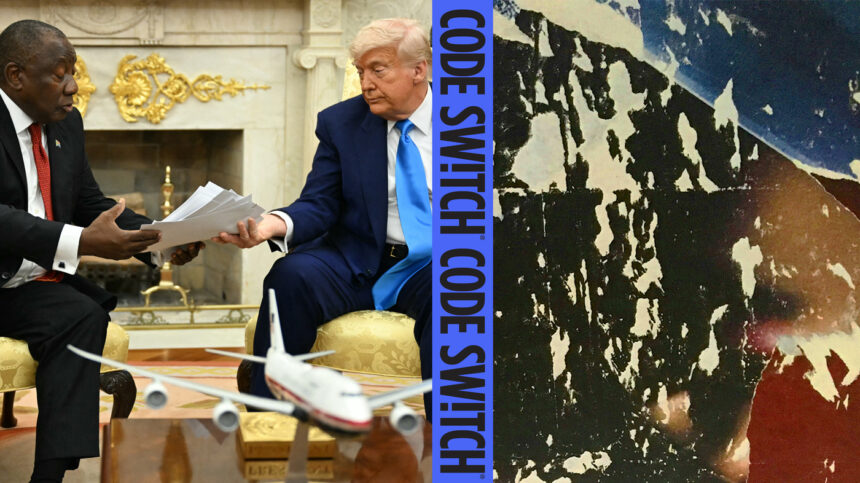The South African president, Ramaphosa, meets President Trump in the midst of tensions about Washington’s resettlement of white Afrikaners that the president of the United States states that they are victims of “genocide.”
The South African president, Ramaphosa, meets President Trump in the midst of tensions about Washington’s resettlement of white Afrikaners that the president of the United States states that they are victims of “genocide.”
How the false notion of “Blanco Genocide” traveled from the political stripes to the Oval office. The week in Code Switch, we are talking to a journalist who was in the living room when President Trump promoted this conspiracy theory to the president of South Africa. And we are digging in what Trump’s fixation in White South Africans tell us about the anxieties about white replacement here in the United States
When former President Donald Trump tweeted in 2018 about South Africa’s land reform and the so-called “large-scale killing of farmers,” many saw it as a nod to a white nationalist conspiracy theory—the myth of “white genocide.” The statement drew international rebuke and was widely discredited by both South African officials and U.S. diplomats. But beyond the fact-checking lies a deeper question: Why did this narrative matter to Trump and his base?
The answer reveals more about the American racial imagination than it does about South Africa.
A Conspiracy Rooted in Projection
The “white genocide” narrative is not born from South Africa—it is cultivated in far-right circles in the U.S., Australia, and Europe, projecting a fear that white people are being systematically replaced or oppressed in societies where they once held uncontested dominance. In the U.S., these ideas dovetail with “replacement theory,” a racist conspiracy suggesting that nonwhite immigration and demographic change threaten the existence of white Americans.
Trump’s amplification of these views wasn’t just a foreign policy blunder—it was a cultural signal. By spotlighting a debunked crisis abroad, he was reinforcing a domestic anxiety: the perceived loss of white identity and privilege in an increasingly diverse America.
South Africa as a Racial Rorschach
Post-apartheid South Africa has long served as a racial Rorschach test for the American right. To some, it embodies the chaos they believe results from redistributing power to the previously oppressed. To others, it symbolizes a hopeful, if complex, journey toward racial reconciliation.
For white nationalists, however, South Africa is a cautionary tale. They frame land reform as “racial revenge” and selective killings as part of a broader anti-white agenda. In doing so, they erase the historical violence of apartheid and colonialism—flipping the script to cast former oppressors as victims.
What This Reveals About the U.S.
Trump’s comments were not just about South Africa; they were about America’s unresolved racial history. By invoking fears of land expropriation and white victimhood, he touched on deeply embedded anxieties about reparations, demographic shifts, and the possibility of true racial equity.
His rhetoric shows how global events are cherry-picked and distorted to reinforce domestic ideologies. It also underscores how the U.S. far right looks abroad not to understand the world, but to find mirrors for its own fears.
Conclusion:
Trump’s tweet was more than misinformation; it was a calculated dog whistle in the global echo chamber of white grievance. Understanding this helps us decode not only his worldview, but the broader strategies of racialized fear-mongering in American politics.










